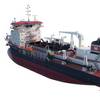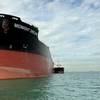ABS has released an expanded Version 2.0 of the Hull Maintenance module of the ABS SafeShip lifecycle integrity management system. The system is applicable to all vessels designed to ABS SafeHull criteria and is provided free to owners as part of an enhanced classification service.
"This new version has much greater functionality that makes it not only easier to use but also more valuable as a tool for shipowners to monitor
and control the maintenance of the vessel's structure over its entire service life," said Rick Neilson, director, SafeShip Development.
Since the launch of ABS SafeShip at Posidonia two years ago, the entire program has been subject to continuous improvement, reflecting valuable
feedback from ship owners and operators. "This new version has received an enthusiastic response, confirming our belief that this is the correct approach for dealing with the ever-increasing quantity, complexity and sophistication of the rules and regulations, applicable to a vessel's structure and machinery, with which classification societies are involved,"
Neilson added.
Further refinements to the Ship Product Model used within SafeShip now allow for improved definition of critical areas and condition tracking. The finer detail allows for the incorporation of brackets and stiffeners, both
in terms of tracking data and graphical representation within the program.
Whereas the program has always been able to store gauging data, the latest version also allows for the creation of gauging plans and permits the
identification and tracking of pits and their condition. The enhanced program can also identify and track the condition of anodes and allows for
the documentation of coating condition and the estimation of coating areas when considering maintenance strategies.
Almost 100 ABS SafeHull approved vessels are now entered into ABS SafeShip for clients such as Hong Kong Ming Wah, MISC, SeaRiver and Minerva. "From the outset our priority has been to create the databases for the vessels at
or nearing their first Special Survey," said Neilson. "It is from that time forward that the power of SafeShip really comes into play."
More than 1,000 man-hours are required for the initial data entry for each ship entered into the system, all of which is provided by ABS at no cost to the owner. "The Ship Product Model is at the heart of the hull maintenance module of the program," Neilson explained. "Every element of the design must be captured electronically to create a 3-D model of the vessel's
structure and of every compartment within the structure so that all subsequent condition data can be directly referenced to the exact location
within the vessel."
The total safety concept embodied within ABS SafeShip starts with the design of the vessel. The application of the rational criteria of ABS
SafeHull accurately determines the static and dynamic loads acting on the ship and models the strength of the global and local structures to resist all relevant failure modes.
One of the key elements of a SafeHull evaluation is the identification of critical areas within the structure that, while meeting all aspects of the relevant Rule criteria, may have a higher probability of failure during the life of the vessel as compared with the surrounding structure.
These areas are addressed in the construction monitoring plan which establishes specific construction standards and control procedures that are to be applied and verified by the shipyard.
On delivery, the SafeShip vessel is automatically entered into the ABS SafeNet program for monitoring survey status. An electronic record of the vessel's key structural, piping and electrical drawings is created, in addition to the detailed 3-D model of the structure and each compartment which then becomes the repository for the lifecycle structural data.
Subscribe for
Maritime Reporter E-News
Maritime Reporter E-News is the maritime industry's largest circulation and most authoritative ENews Service, delivered to your Email five times per week










